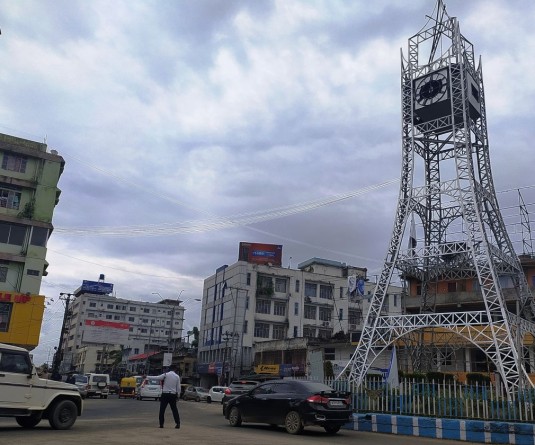
Dr Imlikumba
Like the multifaceted culture in our State Nagaland, traditional medicines have evolved over centuries. The Indian System of Medicine is of great antiquity. It is increasingly understood that no single health care system can provide satisfactory answers to all the health needs of modern society. Evidently there is a need for a new inclusive and integrated health care regime that should guide health policies and programmes in future.
A separate Department of Indian Systems of Medicine and Homoeopathy (ISM&H) was set up in 1995 to ensure the optimal development and propagation of AYUSH systems of health care. The Department of ISM&H was re-named as the Department of AYUSH (an acronym for - Ayurveda, Yoga and Naturopathy, Unani, Siddha, Homoeopathy) in November 2003. Medical pluralism is here to stay and the AYUSH sector has a critical role to play in the new and emerging situation. The Department of AYUSH under Ministry of Health and Family Welfare, promotes and propagates Indian systems of Medicine and is committed to infuse the wisdom of traditional medicine with the methodologies of modern science, relating their efficacy to modern life styles. Bringing AYUSH into the mainstream health care delivery system of the country has long been a major policy objective of the Department. Under the NRHM, AYUSH facilities are being set up in PHCs and CHCs and are being manned by qualified AYUSH physicians appointed on contract basis.
AYURVEDA: Ayurveda is a classical system of medicine originating from the Vedas, founded around 5000 years ago in India, and currently recognized and practiced in India and many subcontinent countries. It is one of the oldest medical systems in the world. Ayurveda is science of life (Ayu +Veda) that takes an integrated view of the physical, mental, spiritual and social aspects of human beings, each impinging on the others. Ayurveda was comprehensively documented in Charak Samhita and Sushrutha Samhita.
The preventive aspect of Ayurveda is called Svasth-Vritt and includes personal hygiene, regular daily and seasonal regimen, appropriate social behaviour and Rasayana Sevana, i.e., use of rejuvenative materials/food and rasayana drugs. The curative treatment consists of three major categories of procedures, Aushadhi(drugs), Anna(diet) and Vihara (Life style as described in Ayurveda). Ayurveda largely uses plants as raw materials for the manufacture of drugs, though materials of animal, marine origin, metals and minerals are also used. Ayurvedic medicines are safe and have little or no known adverse side-effects. Initially Ayurveda developed into eight distinct specialities, i.e.,
• Kayachikitsa (Internal Medicine) • Kaumar Bhritya (Pediatrics) • Graha Chikitsa (Psychiatry) • Shalakya (Eye and ENT) • Shalya Tantra (Surgery) • Visha-Tantra (Toxicology) • Rasayana (Geriatrics) • Vajikarna (Science of virility).
Ayurveda provides a host of treatments for complex diseases. Traditional and time-tested systems of Ayurveda for holistic healing are available around the country. During recent years, Kshar-Sutra and Panchkarma have become more popular among the public.
Panchakarma is a unique therapeutic procedure for the radical elimination of disease-causing-factors and to maintain the equilibrium of doshas. The Panchakarma therapy minimizes the chances of recurrence of the diseases and promotes positive health by rejuvenating the vital body systems. Kshar-Sutra is an Ayurvedic para-surgical intervention using a medicated thread, which is extremely effective in the treatment of fistula-in-ano and conditions which demand gradual excision of overgrown soft tissues like polyps, warts, non healing chronic ulcers and sinuses and papillae without need of hospitalization, antibiotics or general anesthesia.
AROGYA MELA: AROGYA Mela, National Level Comprehensive health fair on Indian systems of Medicines. The 4 day (12 Dec-15 Dec 2017) long fair is organised by Ministry of AYUSH, Government of India in association with Department of Health & Family Welfare, Government of Nagaland. The Mela with the objective to promote, propagate and showcase strengths and potential of Indian Systems of Medicines. The Exhibition will be opened to General public from 10 AM to 4 PM with no entry fees at Assam Rifle Ground, Mokokchung. The major attraction for the common public will be the display and sale of AYUSH medicines, Herbal Products and Medicinal Plants. There will be health check-up clinics, free distribution of selected AYUSH medicines, free health public lecturers, free counselling sessions by doctors, demonstration of home remedies for treatment of common ailments.
The Mela will have large participation from AYUSH Drug Manufacturers, Healthcare products manufacturers.
MAIN FEATURE OF AYUSH AROGYA MELA:
• Display and sale of AYUSH products. • Free consultation from AYUSH specialists and free medicines. • Medical plants expo and awareness of cultivation of medical plants. • Health supplements and nutrition. • Beauty and wellness consultations. • Participation of local indigenous practioners.
DISPLAY PROFILES:
• Health camps of different alternate medicines (Ayurveda, Yoga and Naturopathy, Unani, Siddha and Homeopathy) will be organized during this occasion. • Scientific Talk Shows by renowned medical professionals. • Community talks providing health tips daily. • Demonstration of home remedies for treatment of common ailments. • Screening of audiovisual materials. • Live yoga demonstration.
Dr Imlikumba is a registered ayurveda practioner working as a Medical Officer (Ayur) in Bokajan Civil Hospital and the Chief Consultant of Health Naturally Clinic, Kevijau Colony. Dimapur. He will be available for free consultation from December 11-15.




